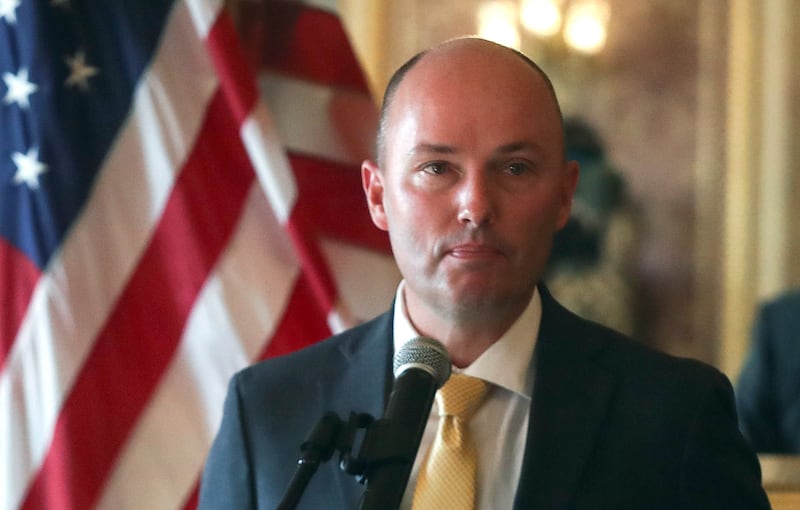When Utah Gov.-elect Spencer Cox began tweeting last weekend that it was a mistake for state lawmakers to withhold teacher bonuses from the Salt Lake City School District, it was a strong sign that he plans to exert candid, outspoken and commonsense leadership as he takes the reins as the state’s chief executive next month.
But he also included a twist that, for lack of a better expression, was so … Cox.
Cox directed his criticisms at Utah House Speaker Brad Wilson, who had been pushing to withhold bonuses from the Salt Lake City District because it had decided to hold nearly all classes online. The two met to discuss their differences, and Cox, despite his displeasure, added this perspective on Twitter:
Wilson, he said, “is an incredible public servant. He isn’t a bomb thrower and is always willing to work for best outcomes. I knew he wouldn’t make this decision for sport. And so I waited until passions could die down and we could talk. And we did.”
Cox, whose political career rose quietly out of the Sanpete County Commission, into the Legislature and then, initially through an appointment, to the lieutenant governor’s office seven years ago, combines the attributes of blunt speaking with civility, respect and the ability to listen and adapt.
Perhaps the best known example of this came four years ago when, after a mass shooting at a gay nightclub in Orlando, he gave a speech apologizing for previous attitudes toward gay people, including things he had said and done as a much younger school student. The speech was politically unnecessary, but obviously motivated by something much deeper. And it resonated deeply with many people.
This combination of candor and respect may be exactly what the state, and the nation, needs right now. It gives reasons for Utahns to look forward to Cox’s leadership, and suggests he could develop a level of credibility and genuineness that makes him a formidable force.
But he will be tested immediately.
When he takes the oath of office on Jan. 4, he also takes the reins of the state’s COVID-19 pandemic response. Too often, that response has been uneven, or seemingly not driven by data. The state’s originally color coded levels of response became useless as officials reacted quickly early on to impose tough restrictions, then were reluctant to reimpose restrictions later, when faced with spiking cases and high death tolls.
We’re anxious to see how Cox plans to lead. Despite being appointed by Gov. Gary Herbert to a pandemic leadership role early on, becoming governor will give him direct and accountable control. The pandemic promises to be an issue well into 2021.
The incoming governor will have many other issues confronting him as well, not the least of which will be related to a pandemic-induced slowdown in economic activity. This will impact everything from public education to infrastructure projects, at least in the short term.
And yet growth, and the rapidly escalating cost of housing, remain pressing concerns. Will Cox be able to formulate policies that spur local governments into more growth-friendly positions? Will he tackle the need to retrofit hundreds of thousands of homes and buildings that are vulnerable to earthquakes? Will he take leadership of tax reforms efforts, protecting programs for the poor while promoting more sustainable tax bases? How will he interact with the Legislature?
Being a governor can test even the most sincere plans and objectives.
We welcome Cox to the challenge. If he remains true to his history of compassionate listening and forceful candor, we like his chances.

